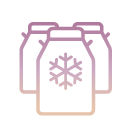
donor egg cells
modern technology and
high treatment outcomes.
to the birth of miracles
What is egg donation?
Egg donation involves in vitro fertilization (IVF) where the eggs come from a donor. Once fertilized in the laboratory, the procedure is the same as in any IVF treatment. At Next Fertility, we have an egg bank that offers the highest guarantees and complies with all the recommendations of leading national and international scientific societies.
What is the price of the treatment and what does it include?
Both frozen and fresh donor eggs are available at Next Fertility Nordic. The best solution for you will be suggested by your doctor together with a donor coordinator. Frozen donor eggs are usually already available in the biobank and the planning of the procedure is therefore faster. The use of fresh donor oocytes depends on when a particular donor is ready to donate.
In vitro fertilization with donor egg cells package from 5750€..
Blast2 guarantee with donor eggs 8000 €.
IVF with donor cells
Starting from: 5750€
- Donor selection and preparation
- Donor compensation
- Consultation with donor coordinator/ IVF experience advisor
- IVF nurse consultation
- Laboratory procedures. Sperm preparation, in vitro fertilisation.
- Embryo culture in the EmbryoScope incubator
- Embryo transplantation
Extra charges: visits, ultrasound scans, analyses, ICSI (for fresh donor eggs), coordination fee (for a patient living abroad), medicines, embryo freezing and storage.
How is the
process?
Do you want to get started?
You’re already in the best hands.
Book your first appointment
Frequently Asked Questions
When is it necessary to see a fertility specialist?
It is considered that a couple should see a specialist in Assisted Reproduction when pregnancy has not been achieved after one year of unprotected sexual intercourse. However, this period is approximate and can vary depending on age. For example, it is recommended to reduce it to 6 months for individuals over 35 years old.
In egg donation, we need to ensure as comprehensively as possible that the donor is healthy. Therefore, we conduct a general medical visit, a gynecological examination with ultrasound, cytology, and cultures for genital infections, blood tests, and screening for infectious diseases such as hepatitis, HIV, syphilis, and herpes. Additionally, we ensure that there are no family or personal medical history of diseases that can be transmitted. All donors also undergo a psychological interview at the clinic.
Finally, genetic analysis is performed, ranging from a comprehensive examination of chromosomes to the search for the 3,500 most common genetic mutations.
When selecting a donor, the law states that the selection should be based on the recipient’s phenotypic traits, such as ethnicity, skin color, hair and eye color, height, and physical build. Our team will make the selection seeking the greatest possible similarity. Furthermore, Next Fertility has one of the largest gamete banks, offering the best guarantees for treatments that require donation. This gives us the assurance that all our donors undergo a comprehensive series of medical, genetic, and psychological tests before being accepted into donation programs. We have the most demanding and comprehensive selection process.

+20 IVF CLINICS

8 Laboratories

9 Countries

3 Biobanks

